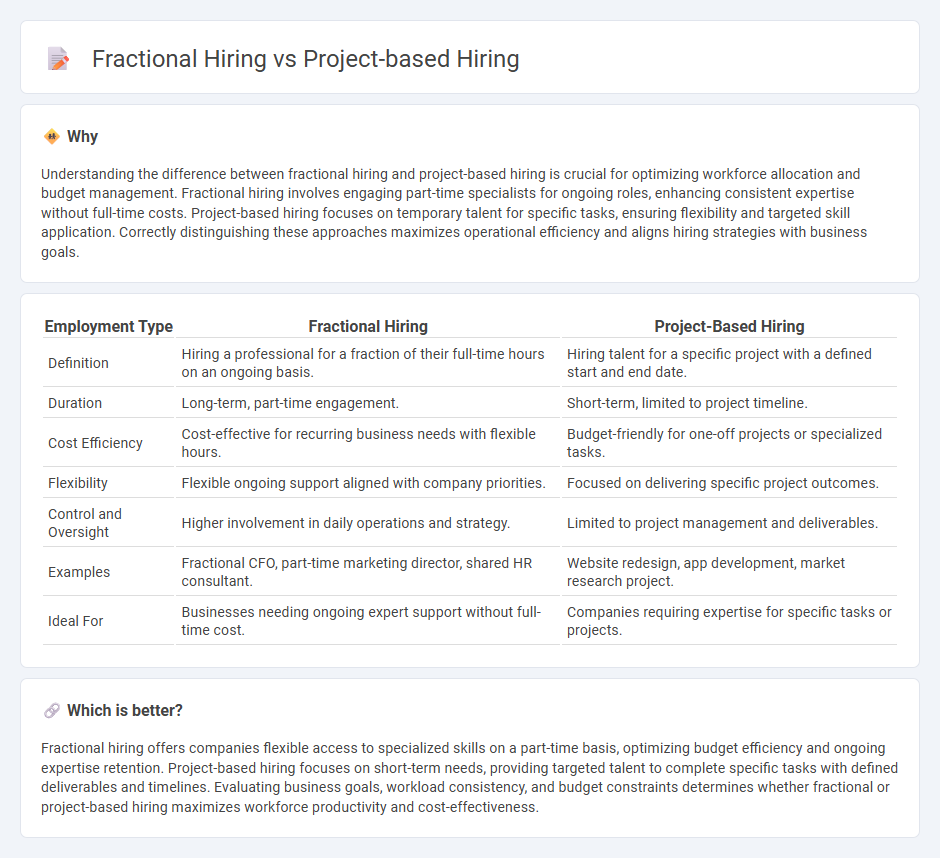
Fractional hiring enables businesses to engage skilled professionals on a part-time basis for specialized roles, optimizing budget and resource allocation without long-term commitments. Project-based hiring offers flexibility by contracting talent specifically for the duration and requirements of a particular project, ensuring focused expertise and timely delivery. Explore the benefits and strategic applications of fractional and project-based hiring to enhance workforce efficiency.
Why it is important
Understanding the difference between fractional hiring and project-based hiring is crucial for optimizing workforce allocation and budget management. Fractional hiring involves engaging part-time specialists for ongoing roles, enhancing consistent expertise without full-time costs. Project-based hiring focuses on temporary talent for specific tasks, ensuring flexibility and targeted skill application. Correctly distinguishing these approaches maximizes operational efficiency and aligns hiring strategies with business goals.
Comparison Table
| Employment Type | Fractional Hiring | Project-Based Hiring |
|---|---|---|
| Definition | Hiring a professional for a fraction of their full-time hours on an ongoing basis. | Hiring talent for a specific project with a defined start and end date. |
| Duration | Long-term, part-time engagement. | Short-term, limited to project timeline. |
| Cost Efficiency | Cost-effective for recurring business needs with flexible hours. | Budget-friendly for one-off projects or specialized tasks. |
| Flexibility | Flexible ongoing support aligned with company priorities. | Focused on delivering specific project outcomes. |
| Control and Oversight | Higher involvement in daily operations and strategy. | Limited to project management and deliverables. |
| Examples | Fractional CFO, part-time marketing director, shared HR consultant. | Website redesign, app development, market research project. |
| Ideal For | Businesses needing ongoing expert support without full-time cost. | Companies requiring expertise for specific tasks or projects. |
Which is better?
Fractional hiring offers companies flexible access to specialized skills on a part-time basis, optimizing budget efficiency and ongoing expertise retention. Project-based hiring focuses on short-term needs, providing targeted talent to complete specific tasks with defined deliverables and timelines. Evaluating business goals, workload consistency, and budget constraints determines whether fractional or project-based hiring maximizes workforce productivity and cost-effectiveness.
Connection
Fractional hiring and project-based hiring both focus on flexible workforce solutions tailored to specific business needs, enabling companies to access specialized skills without long-term commitments. These hiring models optimize resource allocation by matching talent to discrete projects or limited-time roles, improving operational efficiency. By leveraging fractional and project-based hiring, organizations reduce overhead costs while maintaining agility in dynamic market environments.
Key Terms
Duration
Project-based hiring typically involves short-term commitments focused on completing specific tasks within a defined timeline, often lasting a few weeks to several months. Fractional hiring offers part-time engagement over extended periods, allowing businesses to access specialized expertise without full-time employment. Explore the advantages of each hiring model to determine the best fit for your organizational needs.
Commitment
Project-based hiring offers companies flexibility by engaging talent for specific tasks with defined deadlines, minimizing long-term obligations. Fractional hiring involves hiring experienced professionals on a part-time basis, providing ongoing strategic support with a moderate but consistent commitment. Discover how each approach can align with your business goals by exploring their commitment dynamics in detail.
Scope of Work
Project-based hiring involves engaging talent for a specific task or deliverable with a clearly defined scope and timeline, ensuring focused expertise for a distinct outcome. Fractional hiring allocates a professional's time across multiple projects or roles, offering flexible support that adjusts to changing business needs and broader responsibilities. Explore the key differences in scope management for both hiring models to optimize your workforce strategy.
Source and External Links
Benefits of Project Based Hiring to Drive Strategic Projects - This approach transforms the way businesses access specialized talent, ensuring agility, efficiency, and cost-effectiveness by hiring professionals for specific projects.
Project-Based Staffing: What It Is, How It Works, and Its Benefits - This flexible staffing method involves hiring professionals to complete specific tasks or projects within a set timeframe, allowing businesses to adapt quickly to changing needs.
Ultimate guide to project-based hiring - This guide details how to implement project-based hiring, highlighting its benefits such as accessing diverse talent and reducing traditional hiring costs.
 dowidth.com
dowidth.com